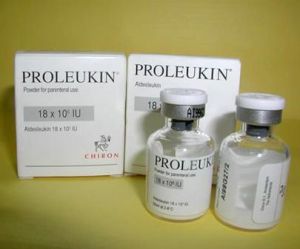
Proleukin Injection
Get Price Quote
Nterleukin-2 (aldesleukin, [Proleukin®]) is a cytokine with the following immune - modulating effects: enhancement of lymphocyte mitogenesis and cytotoxicity, induction of lymphocyte - activated (LAK) cells and natural killer (NK) cells, and induction of interferon gamma production. U.S. Food and Drug Administration (FDA) - approved labeled indications include the treatment of metastatic renal cell carcinoma and metastatic malignant melanoma. Other oncologic applications of IL - 2 monotherapy are being actively investigated, principally as a technique to maintain remission or eliminate minimal residual disease in patients with a variety of malignancies, including most prominently leukemias, but also including lymphomas and other solid tumors such as neuroblastoma and breast cancer. IL - 2 has also been used post - autologous bone marrow transplantation as an immunotherapeutic technique to maintain remission and reduce the relapse rate. In HIV-infected patients, there is a reduced endogenous production of IL-2 and a defect in IL-2 receptor expression, respon sible in part for the characteristic reduction in CD4 counts. Exogenous IL-2, in conjunction with antiretroviral therapy, has been investigated as a technique to increase CD4 counts, preserve immune function and hopefully decrease the incidence of opportu nistic infections. It has been proposed that IL-2 in conjunction with combination antiretroviral therapy may be a useful approach for purging HIV from the latently infected CD4 cells. IL-2 has also been investigated as a component of a variety of combinat ion therapies, for example in combination with interferon alpha in the treatment of metastatic renal cell cancer and metastatic melanoma. IL -2 can be administered by subcutaneous injection (low-dose therapy) or into a vein (intermediate or high-dose therapy), either intermittently as a bolus or quick injection, or as a continuous treatment over a defined period of time.